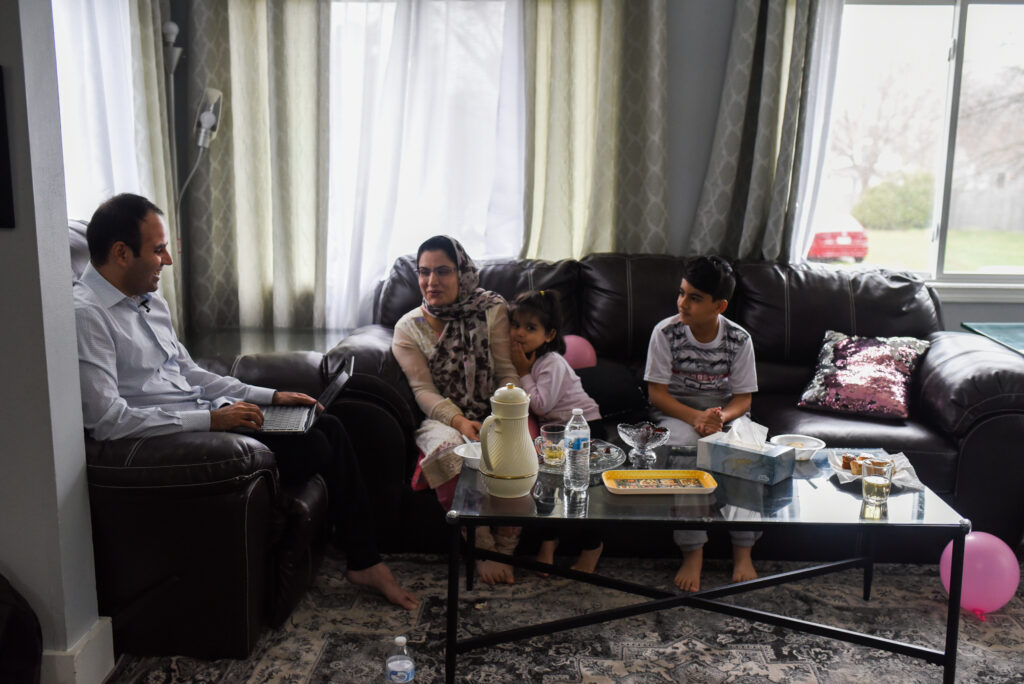by Kelly Krabill

When Fazal Baryalai awoke on a Saturday morning in March after a late night driving Uber customers, his family was already downstairs. Shai tea, an Arabic drink served to visitors, was already in a pitcher on the coffee table waiting to be poured into ornately designed crystal glasses. As I sipped the warm drink on that snowy day in Akron, Zahida, Baryalai’s wife, slipped into the kitchen and returned with a pudding-like dessert and homemade sweet bread. She made food like this when they lived in Afghanistan, where Baryalai had a decade-long career with the government.
“Most of my background is related to the media,” he said. “I used to be an acting spokesperson to the governor.”
In his former life, Baryalai earned a four-year law and political science degree from Mirwais Neeka University in the city of Kandahar, which led him to a press secretarial position and later the director of the Culture and Information Department in the governor’s office in Kandahar. The department “had a newspaper, we were supervising local news agencies, and we were conducting various culture programs,” he said.
But the 35-year-old was looking for work when he arrived in the North Hill neighborhood of Akron two years ago with his wife and two children. He said he was jobless the first three months, and a grocery store owner told him about an opening at a gas station.
“I said sure I need a job whatever that is. So, the next day I went there and I was hired and I’m still there.”
Fazal Baryalai
He checks out customers at the front counter, disperses inventory onto shelves layered with snack items and cleans rows of gas pumps during his 10-hour shift.
He came to Akron under a Special Immigrant Visa in 2019, which is a visa granted to Afghans and Iraqis who worked with the U.S. government. Baryalai worked as a construction manager with the military from 2009-2013, making him eligible for the visa. He left a lot behind including his career.
“Before I came here, I knew that I have to forget my background,” Baryalai said.
He had a short window of time to start over and find employment.
Refugees resettling in the U.S. have 90 days to get a job. Agencies such as the International Institute of Akron work with employers to place clients into steady positions that pay a minimum wage of at least $14 an hour.
“We have been very successful in placing them,” said Jamal Feeresta, the director of education and job development at the International Institute of Akron.
IIA placed 20-25 refugees into jobs in February, but Feerasta added that it’s difficult to measure where that number comes from with the overall refugee population in Akron. He also said that many immigrants who come into Akron live in the North Hill neighborhood and find work through nearby friends or neighbors.
“Sometimes we are involved in [their employment, and] sometimes they get their job from their own reference.”
More Than Gourmet, a food manufacturing company in North Hill that specializes in broths, sauces and seasonings, has hired refugees referred by IIA. The General Manager Jeff Witherite said two Nepali natives and three people from Congo were the start of refugees employed at the business nearly five years ago. Just in the last few months about 20 Nepali people joined the team.
Baryalai met with IIA about the work he did in Afghanistan and finding employment in Akron when he first arrived.
“We began to explore what other friends, relatives [and] people they know that might be interested in working for us,” Witherite said.
“He told me that I will not be able to find a job related to my background in the U.S. He said that ‘we will try to find a job, but you have to try and work whatever that is.’ I said ‘sure, I totally understand.’”
Fazal Baryalai
His friend suggested he talk to the grocery store owner about the job at Marathon.
In the first 90 days of arrival, IIA pays for newcomers’ rent, utility bills and food, which comes from federal and state grants. In addition to that money, Baryalai said he was also given $400 a month for the first three months.
Refugee resettlement programs have specific requirements for those receiving the services, and if they don’t comply, financial sanctions will happen. IIA focuses its efforts on a two-day cultural orientation class, English classes that account for 64 hours and job training.
Feerasta explained that not every refugee arriving in Akron is ready to work in the U.S due to different levels of education and various degrees of employment regulations. “They could be job ready in their own country, but they may not be ready for the kinds of jobs that’s available [in the U.S.]”
But when work is found, he added that they have to take the job.
Baryalai’s former career didn’t stop at the governor’s office. After working in Kandahar, he was then appointed by the president of Afghanistan as a member of the Access to Information Commission in Afghanistan’s capital city Kabul.
But safety was an issue. He encountered several bomb blasts and suicide attacks while working both in Kandahar and Kabul.
“I was once injured,” he explained. “I was in a gathering or a meeting of [the] provincial council. At that time there was a very big bomb blast. So, I was injured in that blast. … It was in 2008.”
He went on to say that he was preparing a press conference for army Gen. Austin Scott Miller, the former commander of U.S. Forces for Afghanistan who came to Kandahar, when a suicide bomber attacked the meeting.
“It was a very bad day for us,” Baryalai added.
He applied for the SIV in 2015. He said safety was the first reason to move his family out of the country, which took time. It was “a very long process.” After submitting several documents that’s required by the U.S. for visa approval, “it took five years, almost five years to get the visa.”
In Afghanistan, he supported his family with a high-paying salary of $3,125 a month, which provides a comfortable lifestyle there. He said they “had a nice house,” and when people come to America “they expect a lot from this country.”
“They didn’t come here to work any job, they came here for a better future.”
Jamal Feeresta, director of education and job development, the International Institute of Akron.
IIA has workforce development programs where team members educate not only refugees about the American workforce but also employers on cultural challenges. Feerasta said the biggest obstacle refugees face is the lack of transportation to get to a job.
“We do give them Uber gift cards to facilitate their first couple of weeks of employment because it’s critical for them to know the place, to navigate and hopefully once they get the paycheck they may be able to get an Uber pass of their own.”
Witherite said the employees who are of refugee population walk or ride their bikes to work when the weather’s nice, but they have also “developed a bit of a network for ride sharing or coming into work together.”
He added the biggest challenge he sees is the language barrier. But the safety manager at More Than Gourmet, who is of Nepali descent, helps train Nepali employees, especially those that don’t speak English.
The company also has training materials translated into Spanish and Nepali. Witherite added that common terms used during someone’s shift is part of the training for non-English speakers as well.
“We do try to assist with general language instruction so that even if someone does not have a strength with speaking English the terms that are specific to our business they can become familiar with them so that it will help them in performing their role.”
The institute also places people at Rubbermaid and Amazon. Baryalai’s wife recently started a job at Amazon because he wasn’t able to work for two months due to an illness. “There’s no need for the language, and there are a lot of Afghans who work there and they help her.”
He added they “have good connections. Most of the Afghans who come [to Akron], we have connections. We find jobs through connections.”
Baryalai makes $13 an hour for a 20-hour work week at Marathon. He also has additional income coming in as an Uber driver, making a total of $1,600 a month, while studying computer science at Stark State College.
“Education is not only for getting money, but you can say one of the most important targets is for having a good income,” he said. “So, that’s why I decided that I had to have a career. The demand for computer science is very high in the U.S.”
